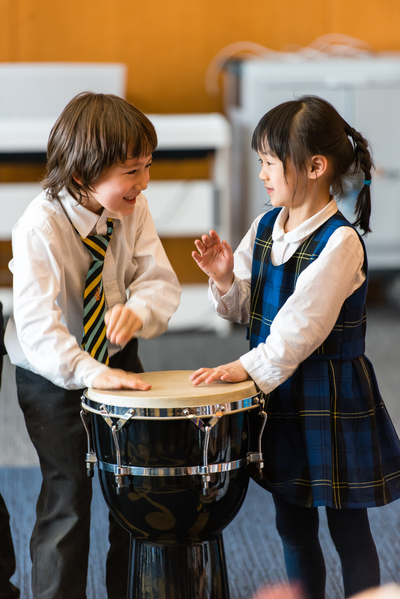Insights | Supporting a growth mindset
22 Aug 2018
“Growth mindset” is the name given by psychologist Carol Dweck to the idea that intelligence can develop, and that effort leads to success.
It is the belief that intelligence can be developed through practice, hard work, dedication and motivation. The opposite, a fixed mindset centres on the notion that intelligence and talent alone will lead to success. People with a fixed mindset believe that these things are ‘fixed’ and cannot be developed or improved upon. They believe that you are either born with it or not, and nothing can change that.
For young learners, their mindset in childhood is heavily influenced by interactions with the environment and humans around them. As adults, we have the extraordinary power (I’m reminded of Spiderman here…with great power comes great responsibility) of forming the minds, beliefs, values, emotions and mindsets of those children in our lives. Our hang-ups, personal ‘quirks’, self-confidence and self-esteem, motivations, inner voice and outer behaviour and reactions as adults were all borne from our experiences as children.
 I can reflect on times when I have watched the reactions of my own children from the words spoken by me. Both positive and negative, the results were profound nonetheless. I have always tried to be the mum who has embraced the process of what my children are doing, rather than the result. Phrases like, “I am so proud of the way you faced that challenge and you didn’t give up” when my sporty older son lost the obstacle race at sports day, or “I really like the way you mix the colours together to create new colours” when my creative younger son produced one of his ‘unique’ pieces of art, don’t always come naturally and require thinking before speaking.
I can reflect on times when I have watched the reactions of my own children from the words spoken by me. Both positive and negative, the results were profound nonetheless. I have always tried to be the mum who has embraced the process of what my children are doing, rather than the result. Phrases like, “I am so proud of the way you faced that challenge and you didn’t give up” when my sporty older son lost the obstacle race at sports day, or “I really like the way you mix the colours together to create new colours” when my creative younger son produced one of his ‘unique’ pieces of art, don’t always come naturally and require thinking before speaking.
 The conversations we have with our (and other people’s) children should focus on their efforts, their personal learning and reflections on the learning process rather than only on the outcome. It’s not all about achieving something, rather how it is achieved. If we only ever focus on the result, or what we perceive the result should be, we neglect the personal journey upon which a child endeavours. Children whose early education and childhood experiences are embedded in achieving targets set by those adults around them will usually grow and evolve in to adults with a fixed mindset. However, children who are surrounded by opportunity to seek challenge*, take risks*, be proud of how they accomplish something (not just the result*), show belief that more effort or a different approach will pay off* and find new ways to do things* will undoubtedly view the world, and their position and potential to achieve in it, differently.
*Characteristics of Effective Learning, Development Matters in the Early Years Foundation Stage (EYFS), 2012.
The conversations we have with our (and other people’s) children should focus on their efforts, their personal learning and reflections on the learning process rather than only on the outcome. It’s not all about achieving something, rather how it is achieved. If we only ever focus on the result, or what we perceive the result should be, we neglect the personal journey upon which a child endeavours. Children whose early education and childhood experiences are embedded in achieving targets set by those adults around them will usually grow and evolve in to adults with a fixed mindset. However, children who are surrounded by opportunity to seek challenge*, take risks*, be proud of how they accomplish something (not just the result*), show belief that more effort or a different approach will pay off* and find new ways to do things* will undoubtedly view the world, and their position and potential to achieve in it, differently.
*Characteristics of Effective Learning, Development Matters in the Early Years Foundation Stage (EYFS), 2012.
 Why is it important to have a growth mindset? Let’s look at why it is important not to have a fixed mindset first. Children with fixed mindsets are more likely to:
Why is it important to have a growth mindset? Let’s look at why it is important not to have a fixed mindset first. Children with fixed mindsets are more likely to:
 I can reflect on times when I have watched the reactions of my own children from the words spoken by me. Both positive and negative, the results were profound nonetheless. I have always tried to be the mum who has embraced the process of what my children are doing, rather than the result. Phrases like, “I am so proud of the way you faced that challenge and you didn’t give up” when my sporty older son lost the obstacle race at sports day, or “I really like the way you mix the colours together to create new colours” when my creative younger son produced one of his ‘unique’ pieces of art, don’t always come naturally and require thinking before speaking.
I can reflect on times when I have watched the reactions of my own children from the words spoken by me. Both positive and negative, the results were profound nonetheless. I have always tried to be the mum who has embraced the process of what my children are doing, rather than the result. Phrases like, “I am so proud of the way you faced that challenge and you didn’t give up” when my sporty older son lost the obstacle race at sports day, or “I really like the way you mix the colours together to create new colours” when my creative younger son produced one of his ‘unique’ pieces of art, don’t always come naturally and require thinking before speaking.
 The conversations we have with our (and other people’s) children should focus on their efforts, their personal learning and reflections on the learning process rather than only on the outcome. It’s not all about achieving something, rather how it is achieved. If we only ever focus on the result, or what we perceive the result should be, we neglect the personal journey upon which a child endeavours. Children whose early education and childhood experiences are embedded in achieving targets set by those adults around them will usually grow and evolve in to adults with a fixed mindset. However, children who are surrounded by opportunity to seek challenge*, take risks*, be proud of how they accomplish something (not just the result*), show belief that more effort or a different approach will pay off* and find new ways to do things* will undoubtedly view the world, and their position and potential to achieve in it, differently.
*Characteristics of Effective Learning, Development Matters in the Early Years Foundation Stage (EYFS), 2012.
The conversations we have with our (and other people’s) children should focus on their efforts, their personal learning and reflections on the learning process rather than only on the outcome. It’s not all about achieving something, rather how it is achieved. If we only ever focus on the result, or what we perceive the result should be, we neglect the personal journey upon which a child endeavours. Children whose early education and childhood experiences are embedded in achieving targets set by those adults around them will usually grow and evolve in to adults with a fixed mindset. However, children who are surrounded by opportunity to seek challenge*, take risks*, be proud of how they accomplish something (not just the result*), show belief that more effort or a different approach will pay off* and find new ways to do things* will undoubtedly view the world, and their position and potential to achieve in it, differently.
*Characteristics of Effective Learning, Development Matters in the Early Years Foundation Stage (EYFS), 2012.
 Why is it important to have a growth mindset? Let’s look at why it is important not to have a fixed mindset first. Children with fixed mindsets are more likely to:
Why is it important to have a growth mindset? Let’s look at why it is important not to have a fixed mindset first. Children with fixed mindsets are more likely to:
- Fear failure
- Give up on tasks they feel are too difficult
- Ignore feedback
- Avoid challenges
- Feel threatened by the success of others
- Learn from the mistakes
- Be motivated to succeed
- Put forth more effort
- Face challenges head on
- Take risks
- Seek feedback
- Learn more
- Learn faster
Related Articles

The Growth Mindset12 Jun 2025
HORIZON VIDEOWith each video in our Horizon series, we explore learning in action. We talk with teachers, parents and pupils from our schools in Tianjin, Shanghai, Hangzhou and Nantong, taking a deep
Read More

You’re invited: Fellows Programme Open House & Sports Showcase05 Mar 2025
Join us on March 18 at 5pm for our very first Fellows Programme Open House and then on Saturday March 22 as we hold our Fellows Sports Showcase. The Wellington Fellows Programme is the flagship of ou
Read More

Get Your Tickets! Summer Festival 2025: Superheroes Assemble!22 Apr 2025
Get ready for an action-packed day of family fun on 10 May at our annual Summer Festival, a proud Wellington tradition hosted by Friends of Wellington (FOW) bringing our whole school community togethe
Read More










